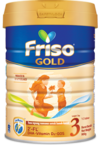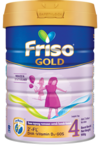Improve Your Child’s Immune System: Stronger Inside To Explore The Outdoors
The great outdoors beckons, but before you let your kids outside, cons.... read more

Since 85% of a child’s core brain structure is formed by the time they turn 51, nutrition plays an important role in their ability to learn.
Your child receives vital nutrients through breastfeeding and/or fortified formula during brain development. With the absorption of the right nutrients, they are then able to engage in their curiosities. At this stage, you can take the opportunity to explore the world with your child using simple cognitive exercises, such as looking for a fruit (like an apple) in a specific colour (like red) when you’re at the supermarket. That will also enable you to build unique bonds with your child.
Your child does most of their learning through their vision. How well they learn depends not just on the ability to see, which requires healthy eyes, but also how the brain processes the information that the eyes take in.That’s why good digestion is important. Because absorbing the right amount of nutrients is vital to the development of their vision, and builds muscles and strengthens bones. It will also help them in the development of their motor skills. This is the perfect opportunity to engage your child in a game of catch, as it requires your child to focus on the ball and track where the ball is going. Your child will learn a variety of skills such as coordination, convergence of eyes and visual motor skills that will help the two of you to experience more of the world around him.
Your child needs to explore and experience to grow and learn. The absorption of the right nutrients ensures physical development, maintenance of digestion and immunity. This will ensure that they will be strong inside as they build up their strength and normal immune system, so that they can ultimately explore and experience more.
Now that you know how important nutrition is for your child to grow strong inside, and for him to learn and discover the world, here are a few tips in ensuring your child eats well.
1. Mix it up
Encourage your child to try many different foods. Try not to exclude any foods, because different sources of essential nutrients are important to a child growing up.
2. Teach healthy habits
Have proper mealtime routines and teach your child which foods are healthy and which aren’t. This helps your child develop healthy eating habits for life.
3. Involve your child in meal preparation
A good way to teach and reinforce healthy eating is to get your child to help you plan healthy meals and buy the necessary groceries. Let your child help with preparing the meal or at least play in the kitchen while you cook. They are less likely to reject foods if they’ve been part of the meal preparation process.
4. Don’t give up
If your child refuses to eat a particular food at one meal, wait a week and try again. It can take 10 to 12 tries before your child develops a preference, so initial resistance to a new food can be overcomed. They might like it next week, so keep trying.
5. Minimise meal-time distractions
Meals should be fun, social and relaxed. But you should also try to minimise possible distractions at the table that would make your toddler lose interest in their food.
Reference
1. Edie, D. and Schmid, D. (2007). Brain Development and Early Learning. Quality Matters: A Policy Brief Series on Early Care and Education, Volume 1 (Winter 2007), 1-4.


